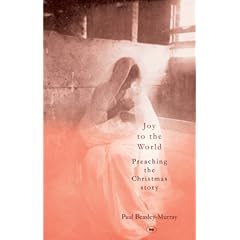
What with it coming up to Christmas and all that, I always like to have some seasonal reading. A particular book which focuses on the Christmas story, or some aspect of it, which concentrates the mind on the good news of the King born in Bethlehem. This year there's another factor in my choice of seasonal reading, given that it is my first preaching Christmas (having missed out on last year's with flu!).
For any pastor, just to survive one Christmas is demanding. But to survive one Christmas after another and still have something fresh to say is a true challenge.
Paul Beasley-Murray has put together a great book of Christmas preaches from his twenty-five years of pastoral and pulpit experience. It's not that the sermons are there for the taking, just read it straight from his book on the night - but that as he covers the Christmas story according to Matthew, Luke and John, as well as the prophecies in the Old Testament and the Epistles as they reflect on it, ideas are given, and new insights are uncovered. His handling of the text is good, and the range of Scriptures dealt with are broad enough to avoid repetition for the congregation!
The best bits of his section on Matthew include the discussion on the genealogy of Jesus as he observes that 'Jesus is not just one member of the family tree, bur the goal of the whole family.' He also has a helpful comment on the scandal of Mary's pregnancy which would be well heeded by Glynn Cardy and St Matthew's Church in New Zealand in connection with their controversial and terrible billboard:
The suggestion is frequently made that Matthew - or at least his source - borrowed this idea from Greek legends, which tell of gods mating with human women. But there are no parallels to the virginal conception which we find in the Gospel accounts of the birth of Jesus. For such 'divine marriages' always involve the god impregnating the woman either through normal sexual intercourse or through some substitute form of penetration. By contrast, the Spirit's work in Mary is to create new life; his role is purely creative, and not at all sexual. (Italics mine)
And finally from Matthew, 'only in [Jesus]' death could his birth receive its meaning.'
As he turns to Luke's account, he discusses Gabriel's greeting addressed to Mary, highlighting the fact that Mary is 'in receipt of God's favour; and the clear implication is that this favour is undeserved' and not, as the Latin Vulgate Bible suggests that Mary is full of grace in and of herself, deservedly. Perhaps the best line in the book, on discussing that nothing is impossible with God, 'a virgin birth is inconceivable.'
In John, he focuses in on the Prologue (1:1-18) and John 3:16, with some helpful insights. I was particularly taken by Luther's comment that John 3:16 is a 'little Bible', because it expresses in brief the good news to be found in the whole Bible.
There was just one issue that I wasn't entirely sure on: his handling of the virgin conception and virgin birth. To be clear, he strives to follow the texts carefully, examining what they say, and what they mean. Perhaps it was just a shock to discover that, in his opinion, the prophecy of the virgin being with child being called Immanuel wasn't a Messianic prophecy which was expected to be fulfilled, nor was it expected to be a virgin - the word in Hebrew in Isaiah 7:14 refers to a maiden (who would have been a virgin as she was unmarried). 'It was only after the event that Matthew saw a special significance in this particular prophecy: there was no way in which it could have created the event.' Later, when writing about Galatians 4:4, and observing that this is not explicitly about the virgin birth, his comment is that 'the wonder of the birth of Jesus is not 'how' he came, but 'that' he came.'
With this slight reservation (and a tiny error concerning Rahab and the spies), the book is still worth a read, particularly for preachers, with many useful asides to preachers and suggestions for themes to develop in our own style. But it's not just for preachers. Any Christian will be encouraged and taught by the comprehensive collection of Christmas sermons.
No comments:
Post a Comment